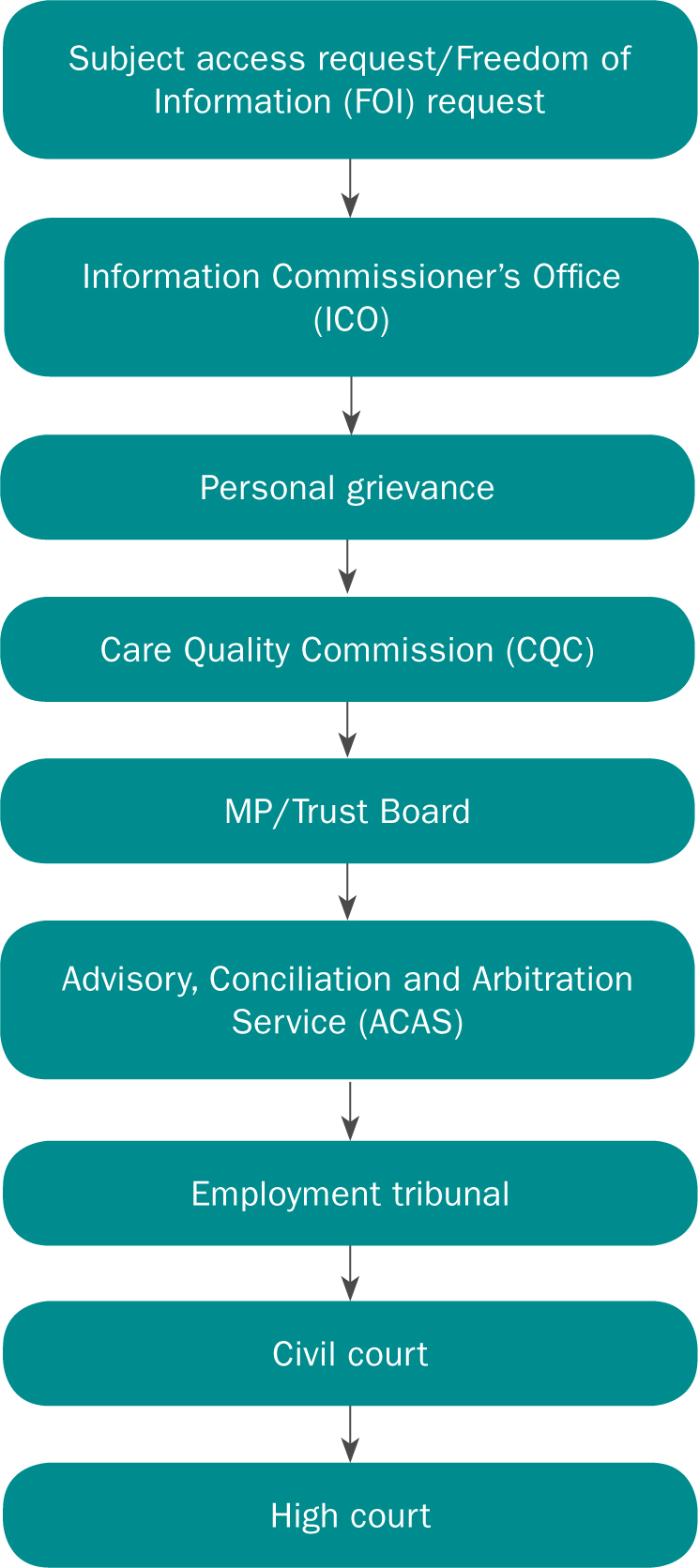Suspension is a tool that can be used by employers in a variety of situations, for example while investigating an allegation against a midwife. What rights do midwives have when they are suspended or dismissed?
The articles of the European Convention on Human Rights [1953] that could apply include (Rights Info, 2018):
Article 14 (right not to be discriminated against) may also apply, although it can only be used in conjunction with another right.
The law has provided for fair process as ‘natural justice’ since the Magna Carta in 1215. These rights are included in the UK Employment Rights Act [1996] and the Human Rights Act [1998].
How does suspension work?
What happens when someone is suspended will depend on the employer. A common scenario is that a midwife is called into the office and told they have been suspended or dismissed, often without proper notice or information. They may be asked for their account of a situation (clinical or otherwise). The midwife has the right to have a support person (including union representative) present, and to know what the allegations and who the accusers are, according to the principles of natural justice and fair process.
Many midwives will believe they are helping themselves and their employer by attending a meeting about their work, but giving an open account without knowing their rights may put a midwife at a serious disadvantage, leading to innocently giving information that is used against them. If there are allegations, midwives have the right to know what they are. This can be done by requesting the agenda, asking for more details about the nature of the meeting or by using the meeting itself to gain more information. Asking what the interviewer would like to know, making notes, and leaving to seek advice are also recommended.
While it is normal to receive full pay during a suspension, there may still be financial implications, as extra shifts and overtime will be cancelled.
What can midwives do if they are suspended?
Seeking information
Employers usually instruct an employee not to talk with fellow colleagues (with a warning that breaking this will result in disciplinary action). That may feel punitive or threatening, but it could also appear reasonable that the employer needs to protect the integrity of an investigation. However, the employee can equally reasonably investigate the same matter, and their need for supportive statements from colleagues is part of their right to fair process and natural justice. This may be done more diplomatically via a third party such as union representative or lawyer, but the midwife is entitled to request statements and information that can help with their defence themselves.
It is important to equalise the inherent power imbalance that employers have and can easily exploit. This can be done by making requests for information that is held by the employer, such as personal files, emails sent and received between specific dates, or CCTV footage. This is called a subject access request (Information Commissioner's Office, 2018a). An individual midwife can make a request to the hospital (usually the same data department that handles Freedom of Information requests). The response must be provided in full and within 1 month.
The information gathered may reveal details of allegations and who has made them. This information is essential to make a proper response and is a legal requirement sometimes ignored by employers. Having this information will assist the midwife in focusing on answering only allegations with real factual evidence.
Escalating a complaint
If information is declined, or simply not provided, then the matter needs to be escalated. The sooner this happens, the sooner the information will be provided, as the employer will have to demonstrate why they failed to comply with the law. This will only happen if the employee can be active in pursuing their rights. It may be tempting to want to appease an employer and not to ‘rock the boat’, but it is interesting that the employer does not appear to have the same hesitations about upsetting employees by suspending them without fair process or reasonable information—even after decades of exemplary service.
Employers will frequently ‘do what they do because they can’. By taking a human rights approach, the midwife can challenge any breaches of law, assert their rights and gain fair treatment. If an employer fails to respond reasonably, then these challenges and assertions will serve well as a paper trail of evidence to present in other arenas, such as the courts or to the Nursing and Midwifery Council (NMC).
By making a personal grievance to Human Resources about an unfair suspension, there is sometimes a fear that the employee will be perceived as a troublemaker and that this will harm their relationship with their employer, resulting in reduced job security. In fact, the likelihood is that an employer will treat the employee with more caution and respect. If the employer appears aggrieved that an employee is standing up for their rights by requesting more information, the employer may further demonstrate unreasonable behaviour that is in breach of the legal requirements.
Trade unions and professional bodies, such as the Royal College of Nursing (RCN), the Royal College of Midwives (RCM) and Unison, provide information and may also provide useful representation. Union representation is very different from instructing a solicitor: unions have large memberships to consider and cannot take instruction from clients. Rather, they will tell midwives how they will handle the case. As a result, self representation can be a better option for those wishing to retain control of their case.
Workplace cultures vary depending on many factors, including leadership. Making a Freedom of Information request may reveal useful details, such as the number of other suspensions and whether there are concerns about an employer's use of this sanction. Similarly, if there are unfounded referrals to the NMC, a Freedom of Information request may reveal useful information that can be passed on to third parties who can investigate the employer.
Unfair suspensions can lead to loss of staff, exacerbating the already dire lack of retention of midwives, a cultural concern that will need addressing at higher levels. This is why sharing experiences and lessons learned can give power to others. Making senior management aware will also increase their level of responsibility and liability.
By including Chief Executives early on, they cannot later say they were unaware of suspension being used as a punitive or unfair practice. Including the NHS Trust Board can also maintain awareness, keep the ball rolling and shine a light on the Chief Executive, who is ultimately responsible for the entire management. Escalating this further means including MPs, the Care Quality Commission (CQC), even the Clinical Commissioning Group (CCG), NHS England, or the Minister for Health.
Figure 1 shows the steps through which a dispute may progress. After submitting a subject access request or Freedom of Information request, a personal grievance can be recorded with Human Resources. If the complaint needs to be escalated further, the Care Quality Commission (CQC) can investigate workplace culture and how it affects service users. It may be helpful at this stage to include the Trust board or your local MP. For disputes that require even more formal procedures, the Advisory, Conciliation and Arbitration Service (ACAS) can provide useful supportive information for midwives, as well as free mediation between the employer and employee(s). If this cannot be resolved, the midwife can go to the civil court to seek financial compensation for claims such as breach of contract by the employer. Finally, there is the option of the High Court, which can be accessed directly by a midwife to overturn a decision by the NMC or for claims for malicious prosecution (allegations that were later refuted, resulting in harm to the midwife). However, pursuing a claim in the High Court can be more complex and costly.

Conclusion

One example of mistreatment is likely to be representative of many other unreported cases; therefore collectivism is important. When there is little support for an individual midwife, the escalation of any unfair treatment is imperative for the retention and survival of midwives more generally.
There may be a risk of personal and professional reputation damage from being suspended from work. This can be minimised by being active in making a robust defence, while also asserting basic employment and human rights.

